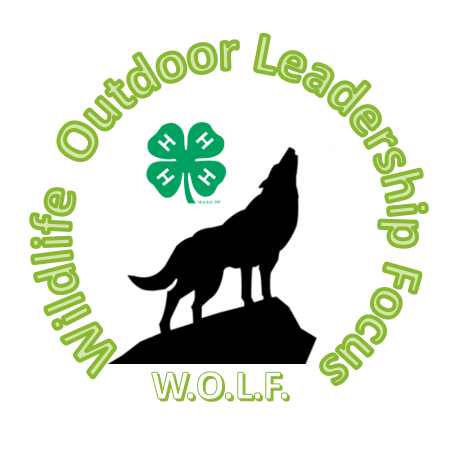
by Ronnie Cowan | Aug 14, 2020
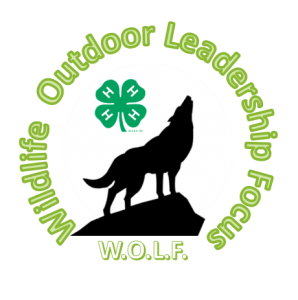
Environmental education can be a very broad topic. The study of how living organisms interact within their environment can be very complicated, especially when we factor in the human element. An Okaloosa County 4-H program Called Wildlife Outdoor Leadership Focus or (W.O.L.F.) was created to address the human dimension of natural resources. Basically, this is a youth conservation program dedicated to making participants aware of the importance of natural resources recreation and to apply the art and science of natural resource management. W.O.L.F. has three main objectives.
Objective 1 – Learn the Importance of Natural Resources
The W.O.L.F. program starts by explaining why these natural resources are important. For example, outdoor activities such as hunting, fishing, boating and wildlife viewing contribute over $25 BILLION to the state of Florida. People are very passionate about their outdoor activities. Florida hunters average nearly $3,000 per person on hunting expenditures per year! Our state has a vast stakeholder interest. Nearly 6 million people participate in wildlife/fisheries activities every year in Florida. The L in W.O.L.F. stands for leadership. Local, state, and federal leaders make important decisions every year regarding natural resource management. Teddy Roosevelt, our 26th President of the United States, established 230 million acres of public land for all to enjoy. Government still protects many of our natural resources today. Florida is home to 175 state parks.
Objective 2 – Apply Theory and Practice Conservation
W.O.L.F. participants receive hands on practice of being a conservationist. The program teaches 4-H members the science and art behind wildlife management. Florida 4-H has a virtual Wildlife Outdoor Leadership Focus (W.O.L.F.) Day Camp were youth can learn at their own pace. The camp has 5 sections: Woods and Fields, Freshwater, Saltwater, Survival, and Biologist life. Each day has videos and activities that offer a daily challenge. W.O.L.F. campers learn about wildlife/plant identification, and what specific wildlife species need to survive. Furthermore, we show youth how our actions, intentional or unintentional, affect the environment we live in. The virtual day camp also covers basic biology of mammals, birds, fish, and reptile. Participants are encouraged to go out with adult supervision and see what’s going on in the great outdoors.
The final activity is the wildlife challenge where campers must be a wildlife biologist for a day. 4-H members are given a scenario with three wildlife species that the landowner wants to manage on a piece of property. The camper must evaluate the property based on the requirements that the 3 wildlife species need in order to survive. The camper completes a wildlife management plan. They look at the best management practices given to them during the course and decide if the property is a habitat for the desired wildlife species. If it is not, they must offer a solution. For example, the landowner wishes to have more northern bobwhite quail on the property but the land is covered in mature hardwoods. The campers are expected to make a recommendation. They learned that quail need shrubs, native grasses, and forbs.
Objective 3 – Career Development and Multi-Science Approach
The W.O.L.F. program also sparks awareness about the professionals who work with our natural resources. Participants virtually meet biologists, wildlife officers, and other natural resource professionals. Each career video will explain how they help our environment. Campers will get to see what it would be like if they had their jobs.
Let 4-H introduce you or your youth to the Wildlife Outdoor Leadership Focus (W.O.L.F.) program. The program does not just stop with wildlife and fisheries science careers. The program explains many more sciences. 4-H members will learn about soil science, forestry, engineering, math, agriculture, and technology to name a few. The only thing your youth will need is a love for the outdoors. If you are interested in W.O.L.F. Camp, please reach out to your local UF/ IFAS County Extension 4-H Agent. The W.O.L.F. program will also be available as a virtual project in Okaloosa County.
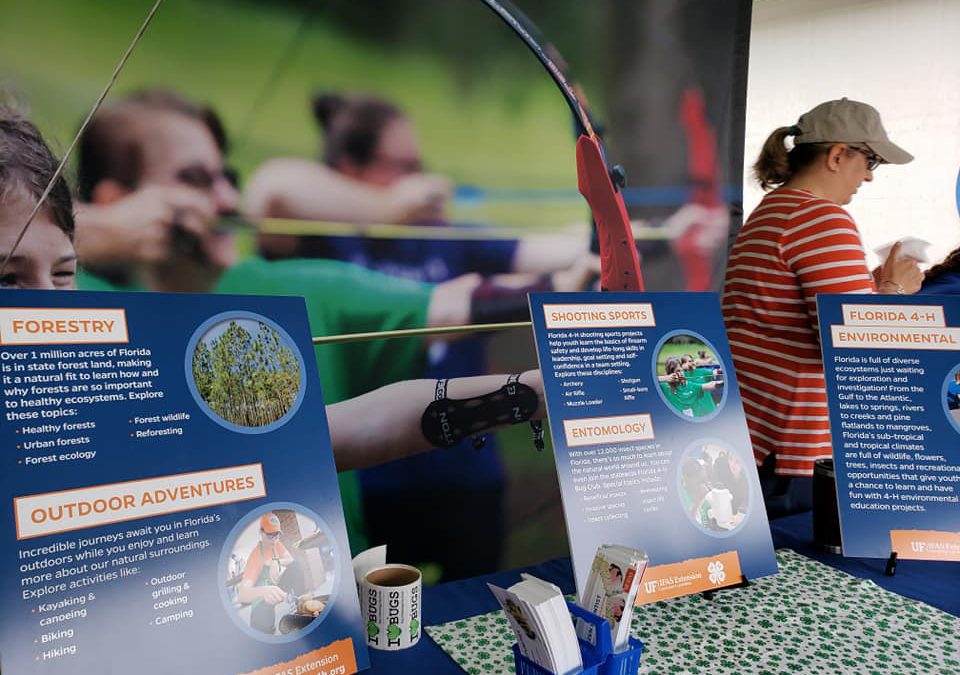
by Heather Kent | Oct 25, 2019
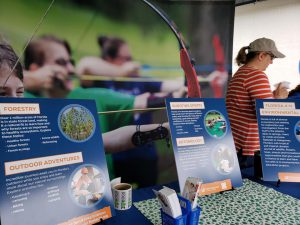
4-H Exhibit at Sunbelt Ag Expo.Photo Credit: Rachel Pienta, UF/IFAS Wakulla County
Sunbelt Ag Expo in Moultrie, GA is “North America’s Premier Farm Show”®. Held the third week in October, land grant universities from across the southeast set up interactive exhibits about the research and programs they provide related to agriculture and natural resources. In addition, there are thousands of industry vendors with exhibits, demonstrations and give-aways. The UF/IFAS Extension building is no exception. This year’s theme was “wildlife” and our building featured five interactive exhibits from 4-H, Family and Consumer Sciences, Natural Resources, Horticulture and Agriculture. Our 4-H exhibit featured some of our most popular 4-H programs related to wildlife: shooting sports, entomology, forestry, and outdoor skills such as kayaking, grilling and orienteering. Extension faculty and specialists manned the building, and were available to answer questions and passed out free bottles of Florida fruit juices and packets of Florida peanuts. If you missed this year’s exhibit, you can experience it at the North Florida Fair, November 7-17th in Tallahassee, FL. Our exhibit (along with the other program areas) will be located in the UF/IFAS Building.
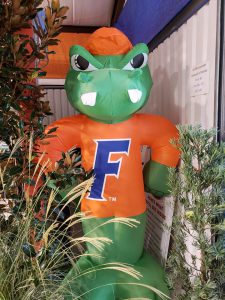
Lots of photo opportunities at Sunbelt Ag Expo! Photo Credit: Rachel Pienta, UF/IFAS Wakulla County
If you have knowledge or skills related to our wildlife project areas, consider becoming a 4-H volunteer! Our wildlife programs are in high demand and we always need volunteers willing to share their passion for our environment with the next generation of Florida’s citizens. For more information, contact your local UF/IFAS County Extension Office or visit our website.
by pmdavis | Jan 5, 2015
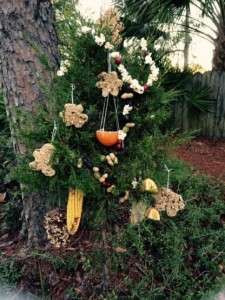
While youth are home over winter break, encourage them to do something fun that will attract wildlife. Nothing is more fun than watching birds or squirrels play in your yard. One way to make this happen is to provide a supplemental food source for them. You can create a special “Tree for Wildlife” in your yard. In fact, a great family activity is making some very inexpensive simple feeders. The most wonderful part is these feeders, they not only look attractive, but help wildlife survive through the winter.
You can create feeders out of bread, bird seed and a binding agent like eggs, lard or peanut butter. Cut stale bread into shapes with cookie cutters. Make a small hole in the top to put twine or string through. If using egg, brush the bread with egg wash and dip in seeds. Then let it dry for a day or so. Attach string and hang in the trees. If using lard or peanut butter, toast the bread to dry it out then spread like you would on a sandwich and roll in bird seed.
Another type of feeder that is popular especially if you have lots of pine trees are pine cone bird feeders. Attach string to a pine cone. Mix peanut butter and oats together then apply to pine cone. After the cone is covered with the mixture roll in bird seed. Lard can be used in place of peanut butter. Hang from tree.
One last type of feeder is using apple and orange slices. Cut thin slices of apples and oranges, attach string and hang each slice separately all around the tree.
Additional feeders could be strings of grapes, raisins, cranberries, raw peanuts, salt free crackers or popcorn. If you are using popcorn be sure it does not have butter and salt. Just use a needle and thread to make the strings. All edible decorations should be hung with biodegradable materials such as cotton string, twine, or thread.
For more information to help you invite wildlife into your yard check out Junior Master Gardener: Wildlife Gardener or Cornell Feeder Watch. Inviting wildlife into your yard provides a fun way for kids to develop a culture to care about nature, while teaching them about their environment. It also makes a great family traditional activity to do not only during the holiday season but throughout the year. 4-H is one of the nation’s most diverse organizations and includes people from all economic, racial, social, political, and geographic categories. There are no barriers to participation by any young person. Participants are given the opportunity to engage in activities that hold their personal interest, while being guided by adult volunteers. The local 4-H Agent is a youth development professional who provides direction and program leadership as part of the nationwide Cooperative Extension System. For more information, contact UF/IFAS Extension at http://florida4h.org/
.






